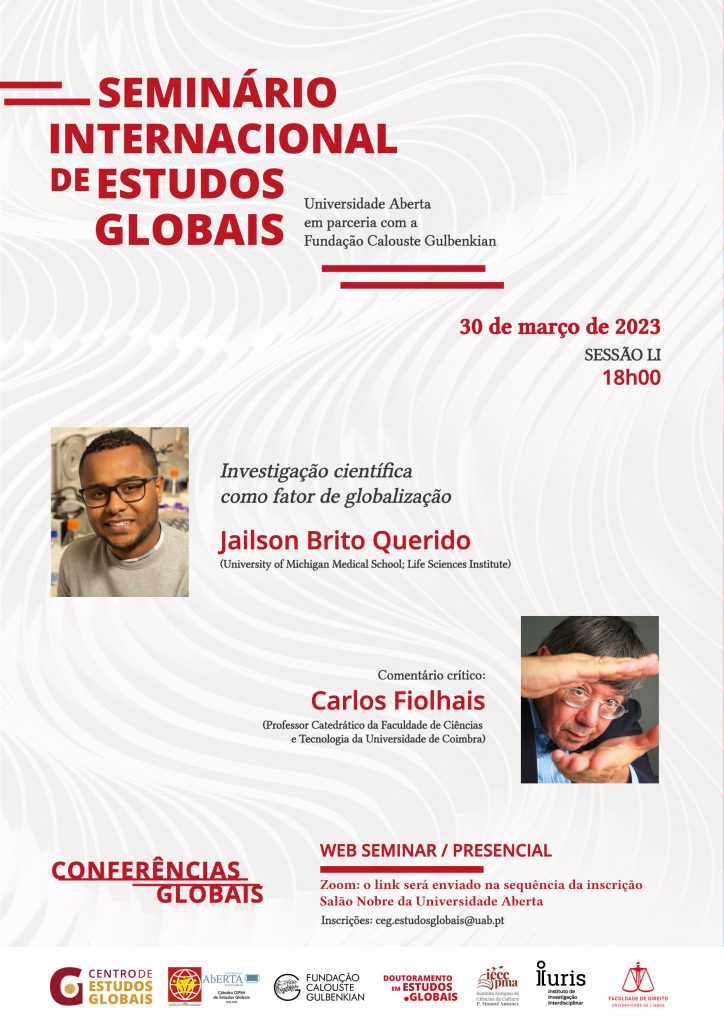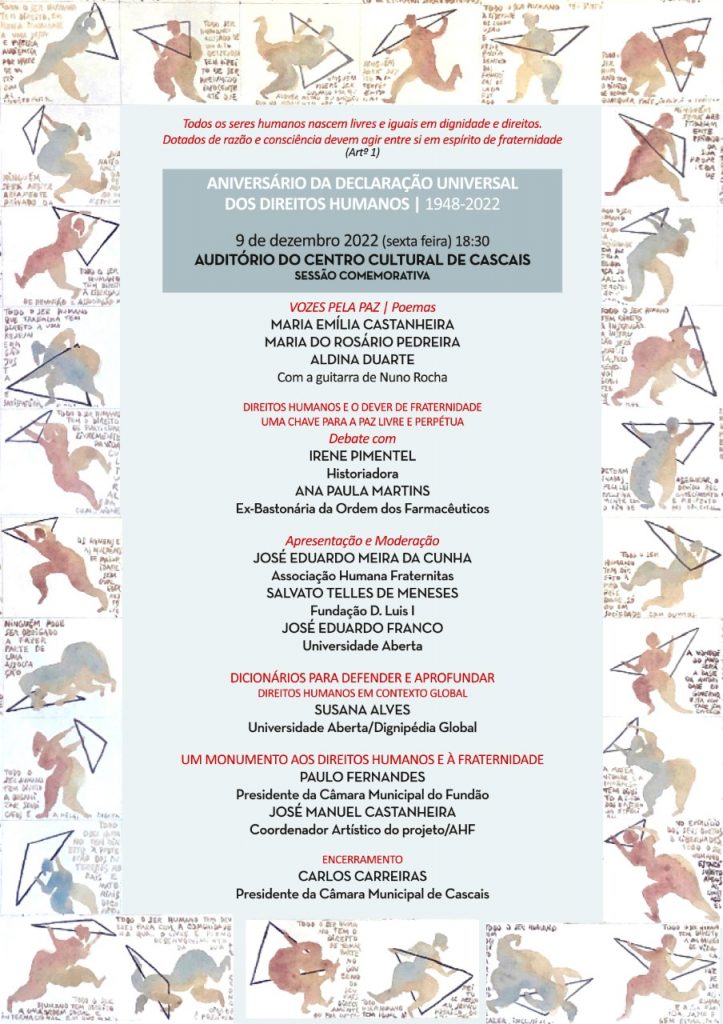(Português) Seminários à Hora do Almoço | 04.05.2023 (quinta-feira), 13h00 | Armindo Armando
(Português) Curso de revisão linguística, gráfica e editorial | Candidaturas até 22 de maio
(Português) Seminário Permanente “Conversão, Educação e Utopias Pedagógicas Globais” | 28 de abril (sexta-feira), 18h00 | Norberto Dallabrida
(Português) Seminários à Hora do Almoço | 26.04.2023 (quarta-feira), 13h00 | Claude B. Stuczynski
(Português) Lançamento do livro “História global da alimentação portuguesa”
(Português) Seminários à Hora do Almoço | 20.04.2023 (quinta-feira), 13h00 | Tarcísio Ekulica
(Português) Seminários em Estudos Globais do Trabalho | 12.04.2023, 18h00 | Fabiane Santana Previtali e Beatriz Abramides
(Português) CEG-UAb | Literatura, Humanismo e Cosmopolitismo | Patrimónios da humanidade #4 | Interculturalidade e globalização: Pessoas e Estados
(Português) CHAMADA DE COMUNICAÇÕES | Congresso Internacional de Espiritualidade e Mística – à procura do não-limite | Braga, 24-27 de abril de 2024
(Português) 6.ª edição do Concurso Estímulo ao Emprego Científico Individual | Candidaturas de 4 de abril a 3 de maio de 2023
(Português) Conferência “Pierre Montet e a descoberta dos túmulos Reais de Tânis”, por José das Candeias Sales
Group 1 | Anthropocene, Sustainability and Development
Presentation
The Group’s general objective, by reflecting on how we relate to the “other” (be it human, animal or nature), the type of social development we advocate and the reasons and consequences of the environmental crisis, is the scientific production that allows us to respond to the social, environmental and organizational challenges in the context of the Anthropocene and globalization, embodied in four axes: critical reflection on the meaning and narratives of development and sustainability; analysis of global and local changes; personal transformations (inner changes); policies and implementation of sustainable development.
We give visibility to questions that lie at the heart of humanity’s current crossroads,namely what does it mean to live in the “age of humans”? How do we relate to the environment on a global and local scale? How do we organize ourselves to care for the common good and build social and climate cohesion and justice? How do we intersect the plurality of narratives about well-being, sustainability and development with more institutional global discourses, such as the Sustainable Development Goals? And how do we implement them taking into account the diversity of social, cultural and political perspectives and contexts? What actors, actions and tools do we need to mobilize in order to establish a new social-ecological contract? How can the environmental, social and human sciences inform understanding and help solve these challenges? Through transdisciplinary scientific research, we seek to contribute to: the promotion of scientific advancement that spills over into teaching and research replication; assisting decision-making in policy contexts at national or local levels; fostering discussion, public participation and co-creation of knowledge, raising awareness and contributing to intra- and intergenerational sustainability.
The group welcomes researchers with these common interests from the fields of Environmental Sciences, Social Sciences, Economics/Management and the Humanities, as well from intersectional areas of study, such as Gender Studies, Anthropocene Studies, Postcolonial Studies, Contemplative Studies, Peace Studies, among others.
Objectives
- To critically reflect on the notion of “development” and humanity’s relationship with natural systems and the global world.
- To analyse the relationship of human activities with the functioning and resilience of ecosystems.
- To explore the concepts and politics of sustainability, development, subjective well-being and happiness in the context of geographical, social and political diversity.
- To propose pathways for personal, social and organisational transformation towards sustainability at different levels and scales.
- To encourage methodological approaches and transdisciplinary action strategies that contribute to the advancement of knowledge on sustainability and development.
- To promote discussion around economic models, international trade and business management that respect the planet’s biophysical limits and social cohesion.
- To contribute with knowledge that may assist the operationalisation of the Sustainable Development Goals for the United Nations 2030 Agenda.
Projects and initiatives
- Book in the Global Studies Collection, Coimbra University Press (in the pipeline).
- Assessing Literacy for Sustainability in Higher Education.
- Development of new modules in Sulitest – related to the assessment of competencies in sustainable development.
- EUSTEPs: “Enhancing Universities’ Sustainability Teaching and Practices through Ecological Footprint”. Strategic Partnership in Higher Education, Agreement No. 2019 – 1- EL01-KA203-062941.
- “CRESTING CiRcular Economy: SusTainability Implications and guidING progress”. H2020-MSCA-ITN-2017.
- “Análisis y Diagnóstico de las nuevas competencias de innovación sostenible requeridas en el perfil de los estudiantes de empresariales en la Universidad Autonoma de Madrid. Redes de Investigación para la Innovación Docente”. Faculty of Economic and Business Sciences, Autonomous University of Madrid.
(Português) Curso “Globalização e Turismo” | candidaturas até 18 de abril
(Português) Seminário Internacional de Estudos Globais (Série Especial “Direitos Humanos e Cidadania Global”) | 27.03.2023 (segunda-feira) | Sarah Schulz
Conferência de Encerramento | Exposição “Tutankhamon em Portugal. Relatos na Imprensa Portuguesa (1922-1939)”
A Exposição “Tutankhamon em Portugal. Relatos na Imprensa Portuguesa (1922-1939)”, patente na Biblioteca Nacional de Portugal desde o dia 4 de novembro de 2022, irá terminar no próximo dia 5 de abril de 2023, na data precisa que assinala o centenário da morte de Lord Carnarvon, o aristocrata inglês financiador da descoberta e escavação do túmulo de Tutankhamon.
Para marcar a data e o encerramento da Exposição, os egiptólogos responsáveis pelo projeto de investigação subjacente à Exposição e comissários da mesma, Prof. Doutor José das Candeias Sales e Doutora Susana Mota, investigadores do Centro de Estudos Globais da Universidade Aberta, proferirão a conferência “ A ‘maldição da múmia’. Relatos na imprensa portuguesa sobre a descoberta do túmulo de Tutankhamon”.
A conferência terá lugar no Auditório da Biblioteca Nacional de Portugal, às 17.45. A entrada é livre.
Seminário Internacional de Estudos Globais | 30.03.2023 (quinta-feira) | Jailson Brito Querido
Realiza-se no próximo dia 30 de março, às 18h00 (hora de Lisboa), uma sessão do Seminário Internacional de Estudos Globais, integrada no ciclo “Conferências Globais”. Nesta sessão, Jailson Brito Querido (University of Michigan Medical School; Life Sciences Institute) apresentará a conferência «Investigação científica como fator de globalização», estando o comentário crítico a cargo de Carlos Fiolhais (Professor Catedrático da Faculdade de Ciências e Tecnologia da Universidade de Coimbra).
A sessão decorrerá em formato misto: presencial, no Salão Nobre da Universidade Aberta (Palácio Ceia), e a distância, através do Zoom: https://videoconf-colibri.zoom.us/j/96514746206.

(Português) Seminário Permanente “Conversão, Educação e Utopias Pedagógicas Globais” | 28 de março (terça-feira), 18h00 | João Pereira de Matos
(Português) Conferência de primavera de 2023 em Literatura, Humanismo e Cosmopolitismo | 29 de março, 18h
(Português) Sessão de apresentação do livro “Nós Globais: investigações em curso sobre questões da globalização” | 5 de abril | Universidade de Coimbra
(Português) Conferência Internacional em Estudos Globais do Trabalho | 24.03.2023 (sexta-feira), 16h00 | Carl Henrik Knutsen
(Português) Fórum Internacional de Estudos Globais, 11-13 de abril de 2023
(Português) Inauguração da Exposição “Visão de Deus” | 25 de março, 16h00 | Porto
(Português) Seminários à Hora do Almoço | 17.03.2023 (sexta-feira), 13h00 | Filipa Medeiros Araújo
(Português) Ciclo de Seminários “Histórias Globais Portuguesas” | 15.03.2023 (quarta-feira), 17h30 | Carlos Fiolhais
(Português) Exposição “Tutankhamon em Portugal: Relatos na Imprensa Portuguesa (1922-1939)” (BNP) | 16 de março, 15h00
(Português) Seminário Internacional de Estudos Globais | 09.03.2023 (quinta-feira) | Mário Pinto Simões
(Português) Abertura das Candidaturas ao Concurso de Bolsas de Doutoramento da FCT | Doutoramento em Estudos Globais
(Português) VISITA-GUIADA | Exposição “Tutankhamon em Portugal: Relatos na Imprensa Portuguesa (1922-1939)” (BNP) | 16 de março, 15h00
(Português) Seminário Permanente “Conversão, Educação e Utopias Pedagógicas Globais” | 28 de fevereiro (terça-feira), 18h00 | Dina Mendonça
(Português) Curso Livre “De Tutankhamon e Carter à tutmania e mumiamania” | 20 e 27 de abril, 4, 11 e 18 de maio
(Português) Ciclo de Conferências “Histórias Globais Portuguesas” | 27.02.2023 (segunda-feira), 17h30 | Marília dos Santos Lopes
(Português) Literatura, Humanismo e Cosmopolitismo | Patrimónios da humanidade #3 | As veredas do Grande Sertão de Guimarães Rosa
(Português) Seminários à Hora do Almoço | 17.02.2023 (sexta-feira), 13h00 | Madalena Carvalho
(Português) Seminários à Hora do Almoço | 14.02.2023, 13h00 | Humberto Schubert Coelho
(Português) Sessão de apresentação do livro “Espaço, Lugar e Território”
Sessão de Informação dedicada ao European Innovation Ecosystems
Seminário Internacional de Estudos Globais (Série Especial “Direitos Humanos e Cidadania Global”) | 11.02.2023 (sábado) | Jan de Groof
GREEN MARBLE 2023 – Encontro Internacional de Estudos do Antropoceno e Ecocrítica: Ecoturismo e Ecoviagens no Antropoceno
iteratura, Humanismo e Cosmopolitismo | Patrimónios da humanidade | O transcendentalismo norte-americano e as suas razões
(Português) XVII Fórum Internacional Permanente de Educação para o Empreendedorismo
(Português) 2.º Ciclo do Seminário Internacional de Estudos Pombalinos | 02.02.2023 (Quinta-Feira) | Nuno Gonçalo Monteiro
(Português) Seminário internacional de Estudos Globais | 01.02.2023 | Mário Farelo
(Português) Seminário internacional de Estudos globais | 26.01.2023 (Quinta-Feira), 18H00 | Pedro José Lopes Clemente
(Português) Ciclo de Conferências “Histórias Globais Portuguesas” | 25.01.2023 (quarta-feira), 17h30 | João Paulo Oliveira e Costa
(Português) Ciclo “Palestras Europeias” | 24.01.2023 (terça-feira), 18h00 | Carlos Gaspar
(Português) Ciclo de Diálogos Ibéricos – Arte, História e Património | 27 de janeiro, 9h30 | Vila Viçosa
(Português) Seminários em Estudos Globais do Trabalho | 13.01.2023, 18h00 | Duarte Rolo
(Português) 1º Encontro ADEGI | Câmara Municipal de Lobos | 9.1.23 | 9h30-18h
(Português) Publicação do n.º 9 da revista “e-Letras com Vida: Revista de Estudos Globais — Humanidades, Ciências e Artes”
(Português) Entrevista a Roger Chartier
(Português) Jornada de Estudos Inacianos: Inácio de Loiola e a(s) sua(s) conversão(ões). 500 anos depois | 16 de dezembro, 10h00 às 19h00 | Universidade Aberta
(Português) Ciclo Permanente de Conferências “Literatura, Humanismo & Cosmopolitismo” | Patrícia Vieira | 19 de dezembro, 17h00
(Português) Seminários à hora do almoço | 15.12.2022, 13H00 | Francisco Pardal
(Português) Seminários em Estudos Globais do trabalho | 14.12.2022, 18h00 | Roberto della Santa e Marcia Malcher
(Português) Aula aberta “Direitos humanos no mundo contemporâneo: História e utopia” | 12 de dezembro, 11h30
Comemoração do aniversário da Declaração Universal dos Direitos Humanos | Amanhã, 9 de Dezembro, Centro Cultural de Cascais
Relembramos que, para assinalar o aniversário da Declaração Universal dos Direitos Humanos, vai realizar-se amanhã, 9 de dezembro, às 18h30, uma Sessão Comemorativa, aberta ao público, no Grande Auditório do Centro Cultural de Cascais.
Organizado pela Associação Humana Fraternitas e pela Fundação D. Luís I, em parceria com o Centro de Estudos Globais da Universidade Aberta, esperamos que este evento venha a ter um significativo apoio e uma adesão bem expressiva, considerando a importância da Declaração Universal dos Direitos Humanos como referência civilizacional, especialmente no contexto da terrível crise geopolítica e ambiental que a Europa e o Mundo estão a viver.
Divulgamos o programa.

